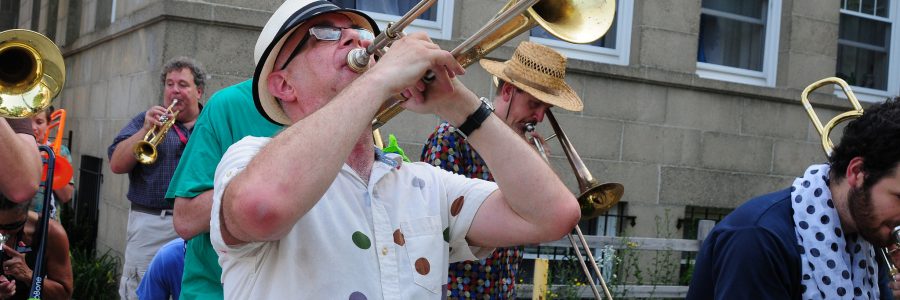Music has always been my home. From wailing about hammers and rowboats with my mom at cribside to singing sappy seventies songs with my brothers in the car, I’ve had a tune in my head and a groove in my heart since forever. Once I picked up the trombone in 7th grade, I played along to any music, anywhere, with anyone who would have me. I played in all the school bands and city orchestras, but I also played along to my record collection, and covered pop and blues tunes with my friends in their basements. I bought a car shortly after my 16th birthday, and started playing in local hotel and party bands, until i found myself in heaven, playing college summers in a wandering clown band at a popular amusement park.
Eventually, I found myself in JUMBO, a large collection of local alternative rockers and others who played barely-recognizable versions of the most ubiquitous circus tunes (think Over The Waves, etc.), usually on old high school wind and brass instruments pulled out of the closet, or toy pianos and the like. Open to anyone who wanted to play, it was a a huge cast of characters, and showed me how a big group with a thoroughly playful attitude can be a bulwark against both musical dissonance and a fear of wrong notes. We were an instant and lasting success, with rooms full of people wondering if we were going to make it to the end of the song… song after song. Eventually, JUMBO went the way of so many other elephants, but that emancipating sense of big, diverse, playful music stuck with me.
Ten years and as many bands later, I joined the Second Line Brass Band, part of a street band revival sweeping the country. These bands have taught me that home is anywhere and everywhere street bands play. They opened my eyes and ears to the real power and possibility of music as action. Not just as a genre, or art form, or even a way of life, I’ve come to imagine brass and drum street bands as perhaps the most accessible and successful expression of collective imagination, with their own, autonomous power to effect real social change.
Street bands get the party started by putting everyone in a playful mood, and ignite the musical and social imagination in others. To play with others in this way is to nourish a deep connection with our kin while simultaneously nourishing love and respect for our own selves. By being playful, we don’t just become our most authentic selves – we glimpse ourselves through the respecting and adoring eyes of our bandmates. That awakening — mutual respect and adoration through play — is the gateway to all other progressive values — love and trust, justice and respect, peace and sustainability — and it is at the heart of our School.
School of HONK takes its name from Somerville’s annual HONK! Festival, when bands from around the world not only play for each other, but quite naturally and easily, with each other, as they share their favorite tunes. Without any of the usual trappings (conductors, sheet music, rehearsal space, sectional practices, home-study) musicians of all stripes soak up new songs, new ideas, and new inspiration from every corner. It’s the most inclusive, edifying and musical music education I’ve ever known, and it was the initial inspiration for the ear-based, mentor-led approach and the riff and groove-based repertoire of our School.
A home I built with friends, our community of players has introduced me to so many new friends and fellow travelers I never would have known otherwise, along with countless spontaneous, precious musical moments, week after week. Sunday afternoons are sacred to me now, and I cannot imagine a more welcome place to play, dance, laugh, love, listen and grow.

